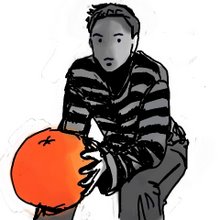Here is just a quick look at a couple of scenarios for today, the final day of the regular season of the Dutch football league.Championship, and the automatic Champions League qualification that goes with it.1 AZ 33 21 9 3 72 81 - 28
2 Ajax 33 22 6 5 72 82 - 35
3 PSV 33 22 6 5 72 70 - 24
AZ - AZ can win their first title in twenty-five years. They play away at lowly Excelsior, who's spot in the relegation play-offs is already a sure thing, so they are likely to rest some starters. A win, barring a blowout in Tilburg, will ensure AZ the championship, the first one since their last one twenty-five years ago outside of what the Dutch call the Traditional Top 3: Ajax, Feyenoord and PSV.
What to expect - You can never be sure about these things, and I've already told you I loathe making predictions, however I will say this: If AZ win the title, expect Louis van Gaal's head to increasingly turn purple, and ultimatly explode.
Ajax - Only two people in this world remain confident Ajax will win the title this afternoon, and those are Henk ten Cate and a crazy homeless guy on a corner somewhere in Amsterdam. Ajax plays away at Willem II, whom they have never had a particular problem with beating, and who's season, for all intents and purposes, is over. However, in case of even the most minimal of AZ wins, a 0-1, Ajax needs to score nine goals. They were well on their way to doing so last week, untill Ten Cate had the genius plan to sub a defender for an extra striker after twenty minutes while already being 3-0 up, and they quickly conceded two.
What to expect - Expect Ten Cate to frantically list every time either the field or a referee decision cost them points, Danny Blind-style. And guess what? They fired Blind. Just saying.
PSV - Were up eleven points months ago. Dropped those points. Idiots. In case of an AZ win, need to score at least ten. Not going to happen. They will score three, Koeman will bring a twelve year old for Farfan and that's all she wrote. In case AZ drops points, they still have a chance to provide the worst meltdown in Dutch Football with the fairytale ending Cocu deserves.
What to expect - Expect Cocu to publically ignore any and all 'tactical' plans by Koeman. Expect whoever is in charge in Eindhoven this week - seriously, they have like a new president every week! - to fire Koeman on the spot, making him the first Koeman to be fired this year, but certainly not the last.
Fifth Place, and the automatic UEFA Cup Goodness and ticket for the CL qualifiers playoff that goes with it.I'll admit it, hardly anybody cares about this but me. Why? I'll show you.
5 Feyenoord 33 15 8 10 53 55 - 61
6 SC Heerenveen 33 15 7 11 52 55 - 42
7 Roda JC 33 14 9 10 51 40 - 36
8 FC Groningen 33 15 6 12 51 54 - 52
Feyenoord - Koeman decided to drop as many points in one season as he could without getting fired, and I must say, a job well done. Feyenoord plays Heerenveen away and needs a win to clinch the position. But Feyenoord hasn't won in a loooong time. A draw might also suffice, but only if Roda and Groningen don't win.
What to expect - Tears, and the first time in the history of football two brothers will be fired on the very same day.
Heerenveen - Also need a win, which would take them over opponents Feyenoord and into europe. They have two advanteges over Feyenoord. 1: they play at home. 2: they aren't a complete farce of a club.
What to expect - A goal by Brazilian striker Alves, at the very least.
Roda JC - Needs a draw between Feyenoord and Heerenveen and a win a bigger win at home against Heracles than a possible Groningen win against Utrecht. Roda's goal difference is better than Feyenoord's, so it would ensure them of fifth place. Hey it can happen! Heracles is done, safe, which means it hasn't anything more to play for and that could be why Roda will mess this up.
What to expect - No draw in the north and a win down south. A frustrated blogger.
Groningen - Can also by-pass Feyenoord and Heerenveen in case of that elusive draw in Heerenveen, but in case of a Roda win also needs to work on it's goal difference against Utrecht, which still has alot to play for.
What to expect - Everything that loves Groningen to curse the decision to insist on playing the final 43 minutes of their game against Ado, which was ended prematurely because of riots. Groningen hoped to work on the aforementioned goal difference in those final 43 minutes after having gone up 0-3 in the first 47 minutes, but instead conceded one goal and scored nill.
Anyways, that's it for me for now, I'm off to Tilburg to work at Willem II - Ajax. I'll weigh in tonight on some of the consequences todays games will have, so check back later! Unless Roda does actually make fifth place, in which case I will check in whenever my hangover wears off.
